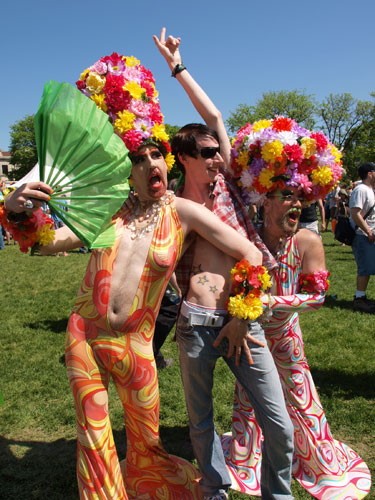Pride: In the name of protest or party?
Views differ as to the purpose of annual event
With organizers expecting 10,000 participants in this year’s Pride celebrations on Sunday, June 6, some people are questioning the purpose of the annual event.
Discussion between members within the gay, lesbian, bisexual, transgender, two-spirit and queer (GLBTTQ) communities has increased on the topic of what Pride is all about. While some see it as a form of protest, others see it as a celebration.
According to Barb Burkowski, who has served as chair of the Winnipeg Pride Committee for two years, there isn’t much need for the GLBTTQ community to protest these days.
“A lot of things that we’d be activists for, we’re fortunate that our government supports us,” said Burkowski.
On Aug. 2, 1987, less than 300 people gathered on the streets of Winnipeg and marched to protest for equality for homosexuals. Most had paper bags on their heads out of fear of public backlash.
They were protesting in a time when homosexuals did not have equal treatment by law as heterosexuals. They were publicly discriminated against and gay marriage was practically unthinkable.
Today, the picture is different. Homosexuals across Canada enjoy the full protection of the law. They cannot be discriminated against in any capacity and have full marriage rights and recognition.
For Burkowski, there is still a need for protest, but not within Canada. There are countries across the world where people are still imprisoned or even killed for the “crime” of homosexuality. These are the places people need to protest for.
“ (Pride should be a) celebration of the fact that we have equal rights in this country, when so many countries don’t have those rights.
Rachel Morgan, editor, Outwords magazine
Rachel Morgan is the editor of Outwords, a local magazine that provides news, analysis and entertainment for the GLBTTQ community. She echoes Burkowski’s sentiments.
“(Pride should be a) celebration of the fact that we have equal rights in this country, when so many countries don’t have those rights,” said Morgan.
Still, some people think the emphasis on protest should be greater.
Gay Shame, an organization founded in Brooklyn, New York in 1998, believes that the GLBTTQ community has become complacent with the corporate sponsorship and commercialization of Gay Pride.
“There are too many corporations and too many voices involved in the planning of Gay Pride,” said Cameron Davidson, an openly gay student at the University of Manitoba who has boycotted Pride for the last four years.
Davidson supports the Gay Shame movement, and believes it will restore “the proud traditions of Pride.”
“All of them are pushing the partying aspect as a way of promoting their products – they are the ones who don’t want the protest,” said Davidson.
Burkowski dismisses comments against corporate sponsorship. People in Winnipeg are still unsure as to what sponsorship will mean, as 2010 marks the first year Pride Winnipeg has received any corporate sponsors.
But the money has been good, allowing for larger celebrations, a change in venue, and even Canadian singer Deborah Cox as the headlining act.
“We have more money to do things – they have to see that it’s all for the community,” said Burkowski.
Davidson agrees that Pride is an event for the community, but cautions people to think about what they’re doing when they attend.
“Partying without protesting is destroying that community and (people) should remember that before they decide to go,” he said.
Published in Volume 64, Number 26 of The Uniter (May 27, 2010)







